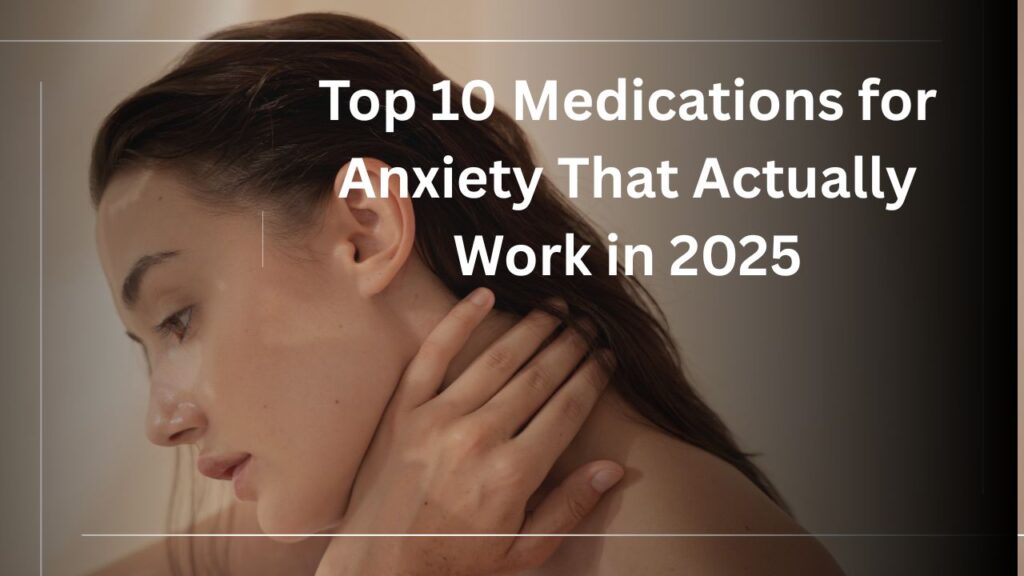Anxiety disorders affect millions worldwide, and finding the right treatment can be life-changing. If you’re wondering what are the top 10 medications for anxiety, you’re in the right place. In this article, we explore the best medications available in 2025 to help manage anxiety effectively.
Table of Contents
Understanding Anxiety Disorders
Anxiety is more than just feeling nervous. It includes a range of disorders like Generalized Anxiety Disorder (GAD), Panic Disorder, Social Anxiety Disorder, and others. Each may require a unique treatment plan.
Symptoms of Anxiety Disorders
- Persistent worry or fear
- Restlessness or feeling on edge
- Fatigue
- Difficulty concentrating
- Irritability
- Sleep disturbances
Proper medication can significantly reduce these symptoms.

How Medications Help Treat Anxiety
Medications work by targeting brain chemicals such as serotonin, dopamine, and GABA. The goal is to balance these neurotransmitters to relieve symptoms.
Types of Anti-Anxiety Medications
- SSRIs (Selective Serotonin Reuptake Inhibitors)
- SNRIs (Serotonin-Norepinephrine Reuptake Inhibitors)
- Benzodiazepines
- Beta-Blockers
- Buspirone
Top 10 Medications for Anxiety
Here are the top 10 medications for anxiety in 2025 based on efficacy, safety, and patient reviews.
1. Sertraline (Zoloft)
Sertraline is one of the most prescribed SSRIs. It’s effective for GAD, social anxiety, and panic disorders.
- Type: SSRI
- Common Side Effects: Nausea, dizziness, insomnia
2. Escitalopram (Lexapro)
Escitalopram is known for its quick response and fewer side effects.
- Type: SSRI
- Common Side Effects: Dry mouth, fatigue, drowsiness
3. Paroxetine (Paxil)
Paroxetine is suitable for various anxiety disorders but may cause more side effects than others.
- Type: SSRI
- Common Side Effects: Weight gain, drowsiness, sexual dysfunction
4. Venlafaxine (Effexor XR)
Effective in treating GAD and panic disorder.
- Type: SNRI
- Common Side Effects: Increased blood pressure, sweating, nausea
5. Duloxetine (Cymbalta)
Also treats chronic pain alongside anxiety.
- Type: SNRI
- Common Side Effects: Dry mouth, fatigue, dizziness
6. Buspirone (Buspar)
Buspirone is non-sedating and non-addictive, ideal for long-term use.
- Type: Anti-anxiety agent
- Common Side Effects: Dizziness, nausea, headache
7. Alprazolam (Xanax)
Known for fast relief, but has a high risk of dependence.
- Type: Benzodiazepine
- Common Side Effects: Drowsiness, coordination problems, dependency
8. Clonazepam (Klonopin)
Offers long-lasting anxiety relief.
- Type: Benzodiazepine
- Common Side Effects: Fatigue, dizziness, memory issues
9. Propranolol (Inderal)
Effective for performance anxiety by controlling physical symptoms.
- Type: Beta-blocker
- Common Side Effects: Fatigue, cold hands, dizziness
10. Hydroxyzine (Vistaril)
An antihistamine that helps reduce anxiety without addiction risks.
- Type: Antihistamine
- Common Side Effects: Drowsiness, dry mouth
Alt Text: Top 10 medications for anxiety
Choosing the Right Medication
Not every medication suits everyone. Your healthcare provider will consider:
- Your specific anxiety disorder
- Coexisting health issues
- Potential side effects
- Drug interactions
Benefits of Medication for Anxiety
- Rapid symptom relief
- Improved quality of life
- Enhanced productivity
- Better sleep patterns
Precautions and Risks
While these medications are effective, they also come with risks:
- Dependence (especially benzodiazepines)
- Withdrawal symptoms
- Long-term side effects
Natural Alternatives to Medications
If you’re wary of prescription drugs, consider:
- Cognitive Behavioral Therapy (CBT)
- Meditation and mindfulness
- Exercise
- Herbal supplements (consult your doctor first)
Internal Links
- [Understanding Generalized Anxiety Disorder]
- [Benefits of CBT for Anxiety]
- [Natural Ways to Relieve Stress]
External Links
Conclusion
Knowing what are the top 10 medications for anxiety can make a world of difference in finding the right treatment. From SSRIs to beta-blockers, there’s a suitable option for nearly every type of anxiety disorder. Always consult a healthcare provider to determine the best choice for your needs.
FAQs
What is the most commonly prescribed anxiety medication?
Sertraline (Zoloft) is among the most commonly prescribed due to its effectiveness and safety profile.
Are anxiety medications addictive?
Some, like benzodiazepines, can be addictive. Others, like SSRIs and SNRIs, are generally not.
How long do anxiety medications take to work?
Most medications take 2 to 6 weeks to show noticeable effects.
Can I stop anxiety medication suddenly?
No, always taper off under medical supervision to avoid withdrawal symptoms.
Are there non-medication treatments for anxiety?
Yes, therapies like CBT, lifestyle changes, and natural remedies can also help.
